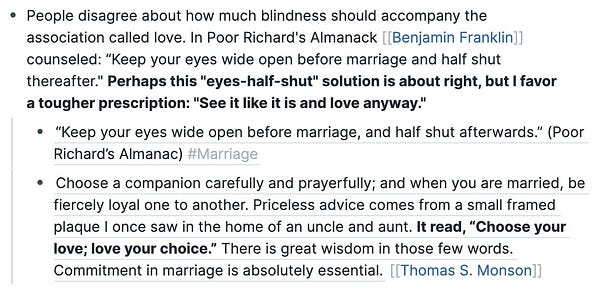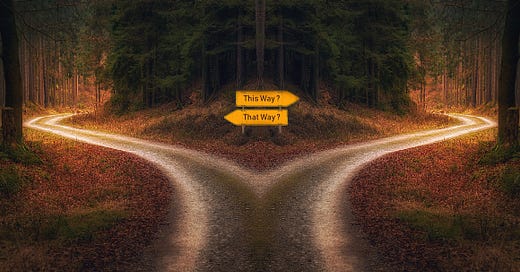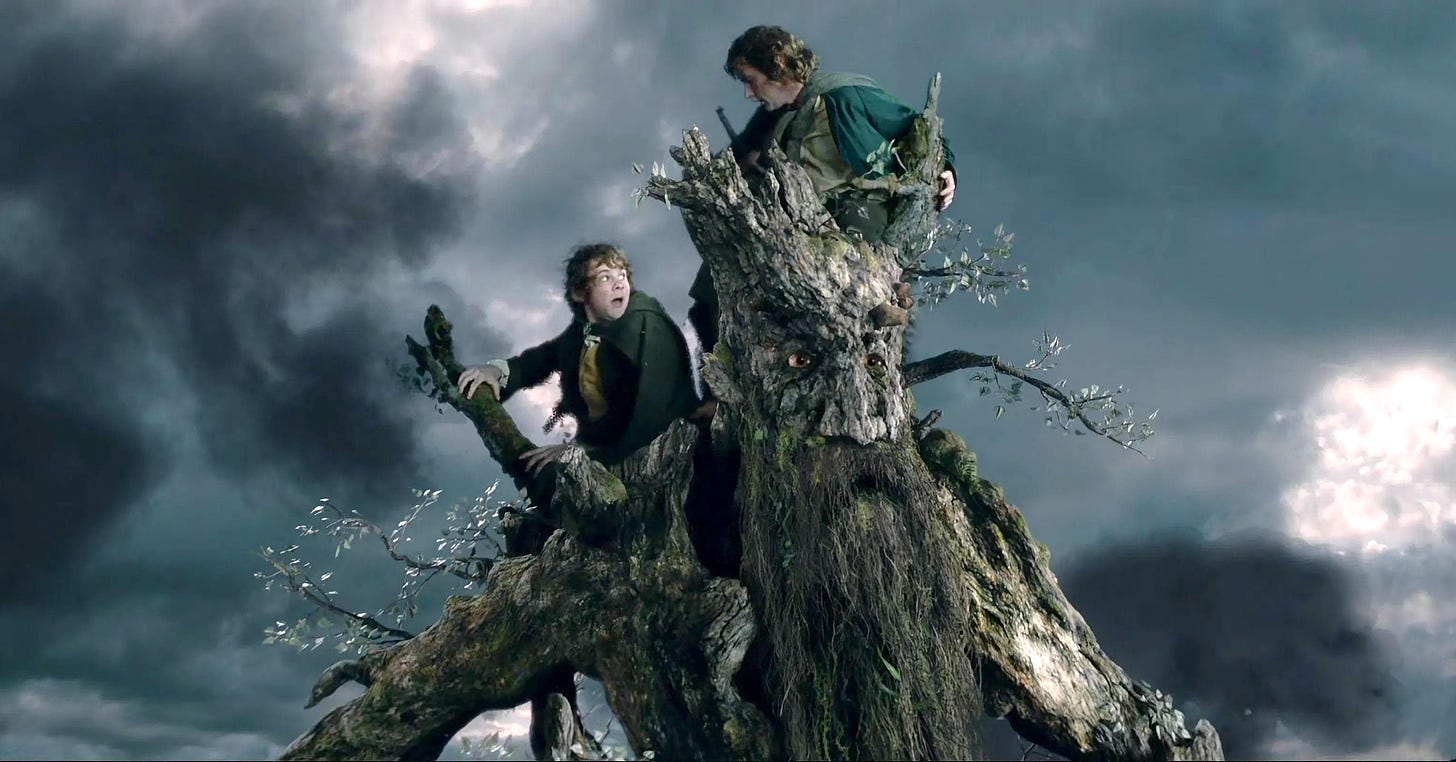This is a weekly newsletter about the art and science of building and investing in tech companies. To receive Investing 101 in your inbox each week, subscribe here:
As I reflect on what I wanted to write about this week, I thought about one of the best film trilogies I've ever seen: The Lord of The Rings. In the second movie, there is a conversation between Merry, Pippin, and Treebeard, while the Ent's are deciding if they'll go to war or not.
Treebeard decides they won't. "This is not our war." Merry's frustration boils over. "But you're part of this world. Aren't you? You must help!" The Ent's refuse to fight, until later when they stumble on a scene of destruction. A valley of trees that they thought of as "their world" had been destroyed. They decided to fight when they realized the impact this war had, not just on "the world," but on their world.
I typically don't use my writing to reflect too often on my more global and political views, but the past week or so has had me reflecting poignantly on some of the things that are going on around the world. First, I've had some reflections on the implications of some world events, and second, trying to reflect on my sense of place in that world.
The Picture Is Bleak?
Venture capital isn't nearly as world changing as it should be. When we reflect on the largest companies that have been funded, there's no doubt they've been impactful. Facebook, Amazon, Google, Snowflake, Flexport. Some of those impacts have been positive, some negative. But the majority of venture capital is about maintaining status quo and enabling incremental improvements. Very rarely does the risk / reward equation used to make funding decisions produce dramatic evolutions in the way the world works.
Earlier this year, I read the book 2034: A Novel of The Next World War written by a former marine and a retired 4-star Naval officer. Everyone should read the book, but the overview is a not-too-distant future prediction of conflict of the U.S., against China, who has established superior warfare technology, and Iran.
The book is bleak. What's worse, many experts in global political warfare believe it's a fairly accurate portrayal of the type of thing that could happen in the future. And with the increasing aggression of nations like China, North Korea, and Russia, it becomes even more disheartening.
Then, over the last few weeks we've seen significant demonstrations against authoritarianism. In China, hundreds of workers erupted in protest against inhuman working conditions, and zero-COVID policies. In Iran, thousands have protested over the last 3 months in response to the death of Mahsa Amini, a 22-year old woman who was killed in custody of morality police for wearing her hijab incorrectly.
These events don't mean the world is magically fixed. But they represent how people are refusing to fall victim to oppressive systems, even if it means putting their lives in danger. When you see all of the things that are wrong with our world, the things that cause suffering, it can be difficult to be optimistic.
Faith and Fear
I'm a religious person. But I consider my guiding principle, as a Christian, to be focused on alleviating suffering, and believing the world can be better. Being faithful and belonging to specific political groups are not synonymous.
My Dad shared this lesson with me over a decade ago, that I've kept in mind ever since: “Pray as if everything depended on God, and then work as if everything depended on you.” And there is a lot of work to do. There are a lot of things that need fixing. When you watch shows like Last Week Tonight, you're confronted over and over again with meaningful problems we're facing.
Among those meaningful problems you see broad existential questions that can make it feel like just being optimistic is fairly contrarian.
Climate change: Can we fight climate change? Can we become an interplanetary society? Or do we, as a species, disappear?
Political polarization: Can we solve the intense tribalism that threatens American systems? Or do we slowly become a failed empire?
Artificial intelligence: Can we unlock the value that AI offers? Will it eventually overpower us? Or will it forever be an unattainable power?
Preserving democracy: Can we reverse the trend of declining access to democracy? Can we help to ensure more people enjoy freedom, rather than less? Or will we sink back into a human rights dark ages?
Choosing the positive outlook on many of those issues can feel more and more contrarian. Believing that we're capable of fighting climate change, improving polarization in the US, mastering AI, and fending off autocracies; that's becoming more and more a rare outlook to have.
I Choose Optimism
In the face of all the pain, and suffering, and corruption, and inefficiency that exists in the world, I still choose to be optimistic. I choose to acknowledge the reality that, in many ways, life is better today than it has ever been before.
"Global life expectancy has more than doubled in the past century, rising to an all-time high of 72. More wealth has been created in the last four decades than in all of human history before then. Two centuries ago, 8 in 10 people still lived in extreme poverty, today it’s fewer than 1 in 10. War, disease and natural disasters now claim fewer lives than at any point in our history. In 1800, nearly half of all children died before the age of five, but today that figure has fallen to less than 4%. Two centuries ago, 88% of the world’s population was illiterate; now only 10%. An average smartphone user in China now has more information at their fingertips than the president of the United States did in 1990."
I have specific roles in which I choose to be optimistic. I'm a husband, and I expect to have an increasingly better relationship with my wife, not worse. I'm a father of three children, and I not only want to have more, but I'm confident that my children can have a happy and fulfilling life. I'm an investor, and I take pride in the opportunity to invest in companies that tackle some of the world's problems directly, whether its Anduril or Modern Intelligence with defense, or Patch with climate change.
I think often of this quote about how personal it is to change the world. While some seek power through the guise of service, others look inside for the opportunity to first change themselves.

So for me, when I choose optimism, I look first at what I can do to be better. What can I offer to make the world better. In many ways, I feel that my impact on my children is the single most important optimistic multiplier I can offer the world.
The Other End of The Stick
I often write about consequences. Picking up one end of a stick will always entail picking up the other. Choosing to be optimistic is picking up one end of the stick. So what's the other? Optimism requires responsibility. It’s not enough to say “everything will be fine.” We have to identify what, within our circle of influence, we can do to help optimism along.
Recently, Trae Stephens and Markie Wagner wrote a phenomenal piece called "Choosing Good Quests." If you're pessimistic, then just try and talk less. You're bringing the rest of us down. But if you're optimistic, then we should all spend time talking about the other end of our optimistic stick. What are we working on?
"Today, we are in a crisis. Silicon Valley's best — our top operators, exited founders, and most powerful investors — are almost all on bad quests. Exiting your first startup only to enter venture capital and fight your peers for allocation in a hot deal is a bad quest. Armchair philosophizing on Twitter is a bad quest. Yachting between emails in de facto retirement at age 35 is a very bad quest. Even among the talented who choose a path of building, most take safe, incremental bets — another SaaS company, another turnkey consumer startup, another digital Beanie Baby. Such pursuits not only fail to push the world forward, but pose a cost in opportunity. There are important challenges facing humanity that no one is working on, including critical, and even existential challenges. In other words, if you are an exceptionally capable person, failure to pursue a good quest is not neutral. It constitutes a loss for humanity."
Earlier this year, Packy McCormick wrote a great piece on Optimism, and then has been sending out a "weekly dose of optimism" to highlight some of the things people are doing with their optimism. We should be inspired by the optimism around us, and then "work as if everything depended on us."

A Caveat
Any time someone tries to emphasize the importance of optimism, you often get this pushback that "not everything is great." One good case study to understand optimism is marriage. Benjamin Franklin would say, "in marriage, keep your eyes wide open before, and half shut afterwards." But there’s a better way.


Some might think optimism requires a level of self-delusion; ignoring the obvious flaws. But the opposite is true. You can never truly love someone or something, unless you fully understand it; flaws and all.
One fantastic example I saw recently of being able to simultaneously acknowledge flaws, and still maintain optimism and appreciation for something, was Tyler Adams' response about how he feels representing the U.S. as the Captain of the U.S team, while there is so much discrimination against black people in his country.
"There's discrimination everywhere you go. One thing I've learned living abroad, and having to fit into different cultures, is that in the U.S. we're continuing to make progress every single day. It's a process. As long as you see progress, that's the most important thing."
Optimism can be a tricky thing to balance. In conversations like defense, you often have two counter-opposing perspectives, both of which are true. The U.S. military has committed meaningful atrocities. At the same time, there are much worse forces that the U.S. uses its military to oppose, and attempt to keep people safe. As a religious person I face this same conundrum. I can simultaneously believe in a specific God, and a specific church, while still acknowledging that many of the people and institutions in my religion have fundamental flaws. This reminded me of another quote by F. Scott Fitzgerald that I constantly return to:
“The test of a first-rate intelligence is the ability to hold two opposed ideas in mind at the same time and still retain the ability to function."
What Does This Mean For Venture Capital?
I haven't talked much about venture and startups this week, but for me this is all just as critical a part of who I want to be as an investor. I don't want to be a meme. I want to be a man. I want to be flesh and blood, with feelings, and passions. I want to pursue things, not because they're "hot" or "buzzy," but because they represent a world I genuinely want to exist.
Venture capitalists, in general, are cogs in a machine to maintain status quo and incremental improvements. The allocation of capital should be an exercise in optimism. We need investors, not those that just learned to talk the talk, but investors who have read science fiction and poetry. Who are both rational, and human. Who recognize the importance of profits, but also factor in the intangible costs and benefits to humanity.
We could be so much better than we are.
Thanks for reading! Subscribe here to receive Investing 101 in your inbox each week:






Greatly written! I too choose optimism, and I think too.. learn to be humble to the world, mankind as a spice is learning too. Check out Hans Rosling book, Factfullness 💯